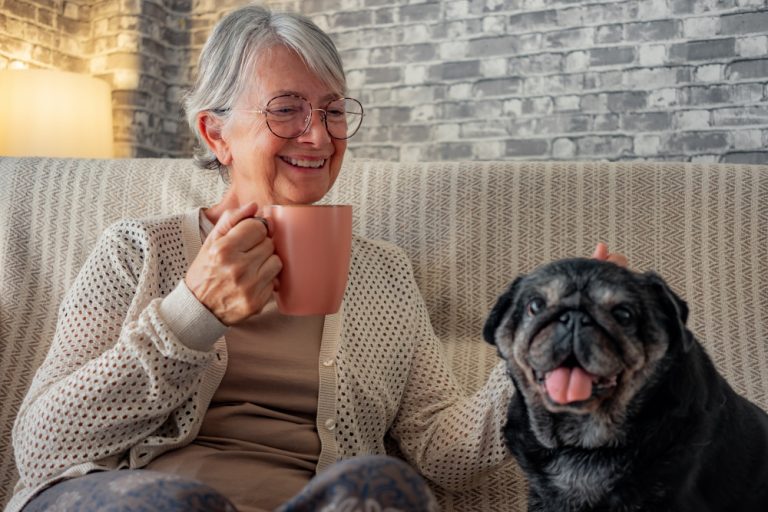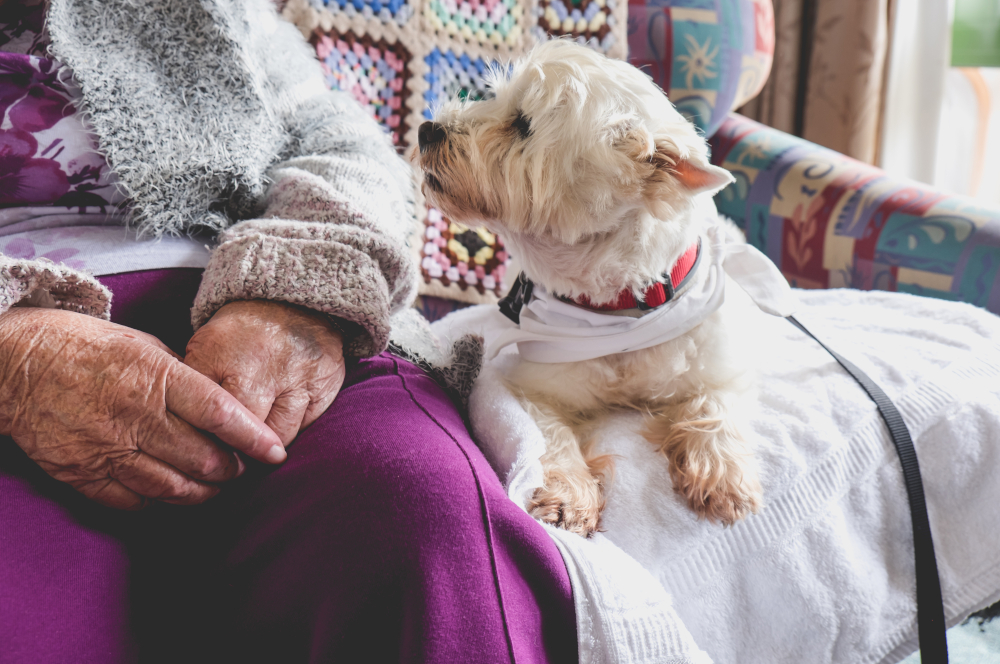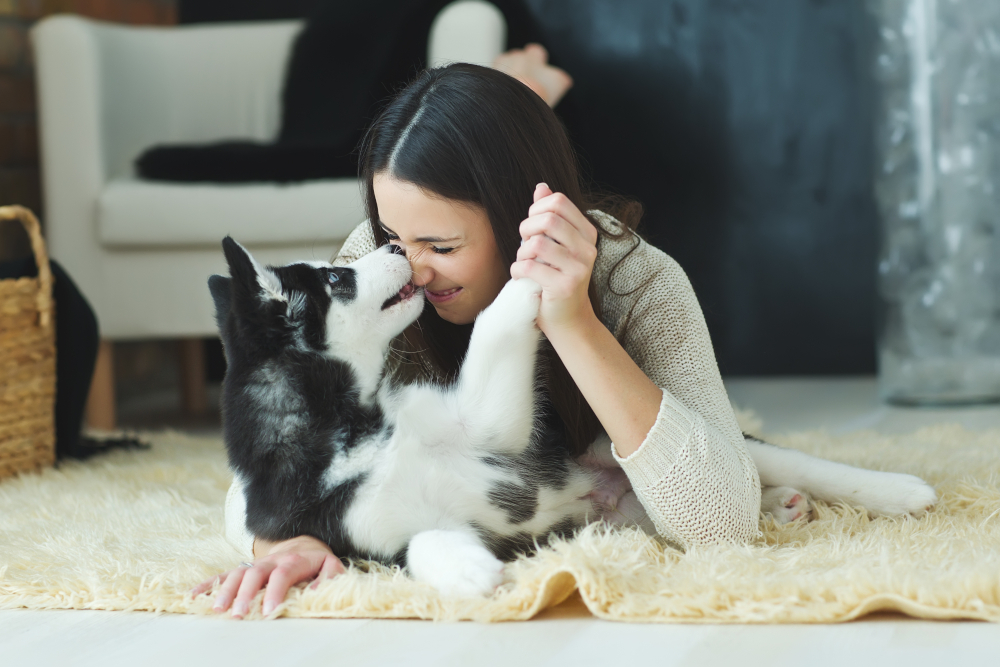For individuals who rely on mobility aids such as wheelchairs, walkers, or canes, navigating daily life can present numerous challenges. However, the presence of a companion dog can significantly enhance their mobility, independence, and overall quality of life.
In the United Kingdom, companion dogs play a vital role in assisting individuals with disabilities, and their inclusion in public spaces is supported by legislation such as the Equality Act 2010.
Advantages of Companion Dogs for People with Mobility Aids:
Physical Assistance
Companion dogs undergo extensive training to provide a wide range of physical assistance to individuals with mobility aids. This training includes tasks tailored to meet the specific needs of their handlers, thereby enhancing their ability to perform daily activities independently and with greater efficiency.
Retrieval of Items
One of the primary tasks of companion dogs is to retrieve items for their handlers. Whether it’s a dropped phone, a set of keys, or a medication bottle, these dogs are trained to fetch objects and bring them to their handler, reducing the need for the individual to bend or reach, which can be challenging for those using mobility aids.
Opening Doors
Opening doors can be a daunting task for individuals requiring mobility aids, especially in public spaces where accessibility may be limited. Companion dogs are trained to push or pull doors open, allowing their handlers to navigate through doorways with ease. This simple yet invaluable assistance promotes independence and autonomy.
Assistance with Transfers
Transferring from a wheelchair to a bed, chair, or vehicle can be physically demanding and potentially risky without assistance. Companion dogs are trained to provide support during transfers by bracing themselves against the handler’s body or providing stability with their bodies. This reduces the strain on the individual and minimises the risk of accidents or injuries.
Balance and Stability
Individuals with mobility aids often struggle with issues related to balance and stability, particularly when traversing uneven terrain or navigating crowded environments. Companion dogs are trained to address these challenges by offering steady support and guidance to their handlers.
Walking Assistance
Companion dogs are taught to walk alongside their handlers, maintaining a steady pace and providing support as needed. They are trained to adjust their gait to match the handler’s pace, making it easier for individuals with mobility aids to maintain balance and stability while walking.
Negotiating Obstacles
Uneven surfaces, curbs, and obstacles pose significant challenges to individuals with mobility aids. Companion dogs are trained to guide their handlers safely around obstacles, alerting them to potential hazards and providing physical support when navigating challenging terrain. This assistance reduces the risk of falls and enhances the individual’s confidence in their ability to move around independently.
Emotional Support
In addition to their practical assistance, companion dogs offer invaluable emotional support to individuals with mobility aids. The bond between a handler and their dog provides a source of comfort, companionship, and emotional stability, particularly during difficult times.
Companionship
Companion dogs are constant companions to their handlers, offering unconditional love and companionship. Their presence provides a sense of comfort and reassurance, reducing feelings of loneliness and isolation often experienced by individuals with mobility aids.
Stress Reduction
The presence of a companion dog has been shown to reduce stress levels and alleviate symptoms of anxiety and depression. The act of petting or interacting with a dog triggers the release of oxytocin and endorphins, neurotransmitters that promote feelings of happiness and relaxation.
Social Connection
Companion dogs serve as powerful social facilitators, helping individuals with mobility aids to connect more easily with others in their community. Their presence often sparks conversations and interactions, fostering a sense of belonging and reducing feelings of social isolation.
Ice Breakers
The presence of a companion dog provides a natural conversation starter, allowing individuals with mobility aids to engage with others more comfortably. Whether it’s a friendly greeting from a passerby or a conversation with a fellow dog lover, these interactions help to break down social barriers and promote inclusion.
Community Integration
Companion dogs play a vital role in facilitating community integration for individuals with mobility aids. By participating in activities such as dog walks, pet-friendly events, and therapy dog visits, handlers and their dogs become valued members of their communities, contributing to a sense of belonging and acceptance.
Legal Considerations in the United Kingdom
In the United Kingdom, companion dogs are recognised as assistance animals under the Equality Act 2010, a pivotal piece of legislation designed to safeguard the rights of individuals with disabilities.
This act prohibits discrimination on the basis of disability and mandates that reasonable accommodations be made to ensure equal access to goods, services, and facilities for all members of society.
As such, companion dogs are granted certain privileges to accompany their handlers in various public spaces, facilitating their integration and participation in everyday life.
Public Transport
Individuals with mobility aids, accompanied by their companion dogs, are afforded legal entitlement to access public transportation services throughout the UK.
This inclusive provision extends to buses, trains, trams, and taxis. Transport providers are obligated to make reasonable adjustments to accommodate both the handler and their assistance dog, thereby ensuring seamless and accessible travel experiences for all passengers.
These adjustments may include designated spaces for dogs within vehicles, clear guidelines for boarding and disembarking, and staff training to support passengers with disabilities and their companion animals.
Public Buildings and Facilities
Companion dogs are welcomed in a wide range of public buildings and facilities, including libraries, museums, government offices, and other communal spaces.
The Equality Act mandates that these establishments must accommodate assistance animals and their handlers, ensuring that individuals with disabilities can fully participate in cultural, educational, and governmental activities.
Necessary accommodations may include designated areas for dogs, clear signage indicating their presence, and staff training to assist visitors with disabilities in navigating the facilities comfortably and independently.
Retail and Hospitality Establishments
Shops, restaurants, hotels, and other retail and hospitality establishments are also subject to the provisions of the Equality Act regarding companion dogs and their handlers.
These businesses are legally required to accommodate assistance animals and their owners, allowing them entry into the premises and providing necessary adjustments to ensure a positive and inclusive customer experience.
Such accommodations may involve designated seating areas for individuals with companion dogs, access to water and rest areas for the animals, and staff training to address any inquiries or concerns regarding the presence of assistance animals on the premises.
Overall, the recognition of companion dogs as assistance animals under the Equality Act 2010 reflects the UK’s commitment to promoting accessibility, inclusion, and equal opportunities for individuals with disabilities. By facilitating the presence of these highly trained animals in public spaces, transportation systems, and commercial establishments, society can foster a more inclusive and supportive environment for all members, regardless of their mobility needs or assistance requirements.
Final Words
Companion dogs play a crucial role in enhancing the mobility, independence, and well-being of individuals who rely on mobility aids in the United Kingdom.
Through their physical assistance, emotional support, and social facilitation, these specially trained animals contribute to a more inclusive society where individuals with disabilities can participate fully and without barriers.
Legal protections ensure that companion dogs and their handlers have equal access to public spaces, transportation, and services, promoting dignity, autonomy, and respect for all.









